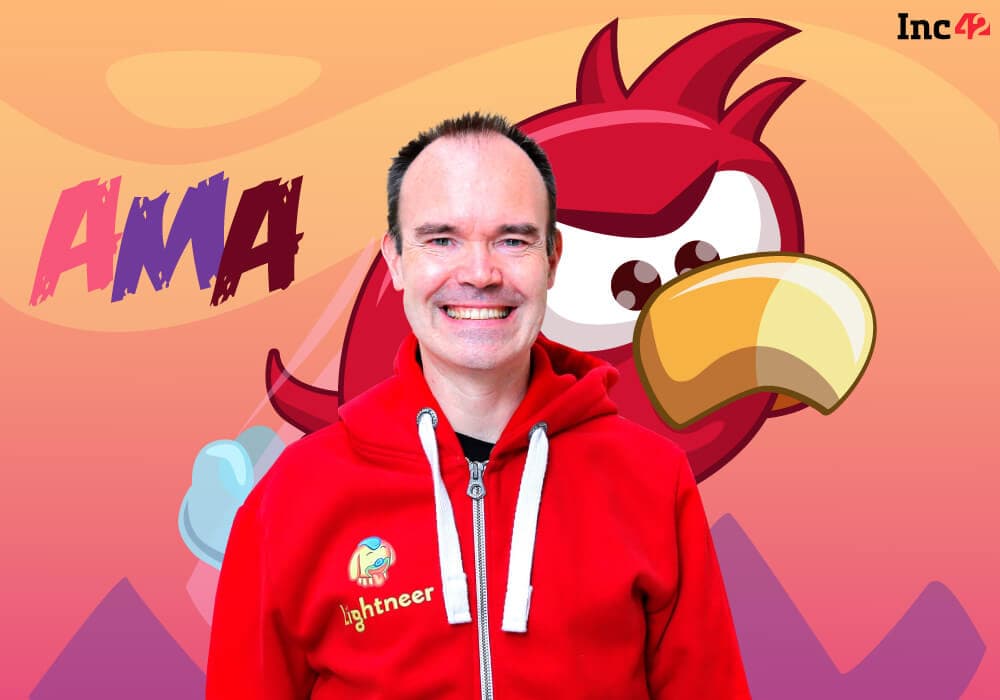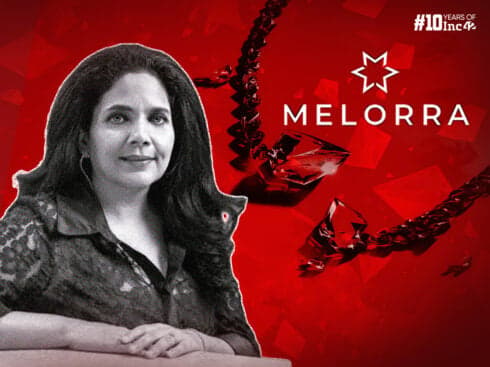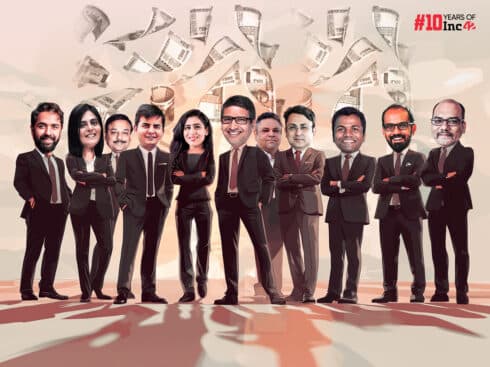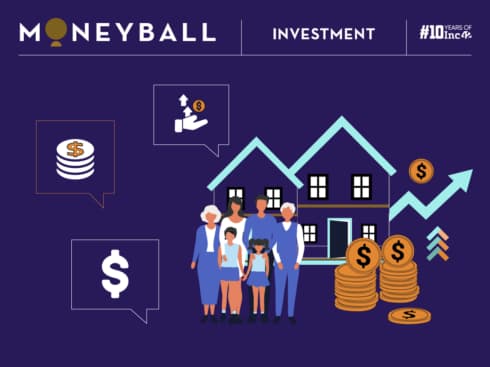In An Exclusive Conversation With Inc42, Peter Vesterbacka Of Angry Birds Sheds Light On The Nordic Startup Ecosystem
Peter Vesterbacka was the force behind creating the world-beating Angry Birds franchise – one of the most significant startups to come out of the Nordics. And today, he is widely acknowledged as the father of the Nordic startup revolution, and the pre-eminent entrepreneur and visionary from the region.
No surprise, he has been listed by TIME magazine as among the 100 most influential people in the world.
Angry Birds is not just a game but a phenomenon. Peter was the first gaming leader to have the vision that creating a stand-alone game is not enough for building a world-beating franchise. The Angry Birds empire was built on a combination of games, animation, movies and merchandising.
Over the last decade, Vesterbacka took on the task of building a strong startup culture in Finland. One of the main initiatives in that direction was Europe’s leading tech event Slush. The astonishing part is that Slush is hosted every year entirely by students and garners over 17,500 attendees, 2,300 startups and 1,100 investors representing 130 countries.
Besides this, Peter has been behind several visionary projects that have helped build the Nordic reputation of innovation. He is the driving force behind the creation of a region that will be Europe’s Silicon Valley. The FinEst Link project is a $15 Bn multi-government infrastructure initiative by the City of Helsinki, Tallinn, the Estonian and Finnish governments. Its goal is to develop mobility between Helsinki and Tallinn by building the world’s longest undersea tunnel and to create a cross-border metropolitan area.
In addition, Peter has also championed several cutting-edge education startups that are set to change learning as he sees learning and skills development as a key area of cooperation between India and Finland/Nordics. No wonder, Peter has increasingly taken on the role of an informal global ambassador of Nordic innovation.
In his recent visit to India, in the hustle of settling down and in the bustle of getting things going, Inc42 caught up with the Nordic entrepreneurship sensation Peter Vesterbacka, the man behind the undying fame of Angry Birds mania.
Flustered with excitement about his India visit, within just hours of his landing, Peter was exhilarated to start the chat about his visit to India, his views on education and the startup ecosystem in India, his knowledge about global trends from Finnish startups, China, Singapore, the Silicon Valley and to shed more light about the India-Nordic collaboration.
Here are the excerpts from the conversation.
Inc42: Is this your first visit to India? And what brings you to India this time?
Peter Vesterbacka: I have actually been asked about this earlier too. Though, this is my first visit to India this year. I think I have been here for about 10 times and I hope I’ll be here more and more in the future.
There has been a growth of 50% in travel between India and Finland. And it's amazing to see that it's not just tourism. I see a lot of Indian startups coming to Helsinki too.
This time we have brought a delegation from Finland and Estonia. We have some startups working in education, fun learning field, AI and Robotics. In the recent times, we have seen a drastic explosion in startups around Nordic and Baltic countries. It’s a great place to be in and then I always like that it is fantastic that we are next to India.
There has been a growth of 50% in travel between India and Finland. And it’s amazing to see that it’s not just tourism. I see a lot of Indian startups coming to Helsinki too.
Peter Vesterbacka On What He Thinks About Indian Startup Ecosystem And India-Nordic Collaboration
Inc42: What do you think about the Indian startup ecosystem. How do you think it compares to the European startup ecosystem?
Peter Vesterbacka: India has one thing going for it and that is the huge market with a lot of talent. That I think is a good start. And of course, with everything else going on in the US and the world, we have also seen many people coming back to India. Then there are many leading entrepreneurs of Indian origin, who are making stuff happen in the Silicon Valley.
We have many startups from Nordics with us and I see massive opportunity to work with India.
The same thing happened in China. All Chinese entrepreneurs went and studied in Europe and the US. And when things started taking off, they moved back to China. And now you see the same here.
One thing I am very excited about this week is that we have many startups from Nordics with us and I see massive opportunity to work with India.
And I think it brings us back to education.
One of the companies we have actually worked with is Edunation. And they are working to bring 150,000 students to Finland by 2020, 30,000 to Estonia. And I totally expect many of those foreign students to be from India because as I said, we are in the neighbourhood and Finland and the Nordic area is very safe.
And then beyond safety, security and geographic proximity, is the fact that our studies are very affordable. Many factors are perfectly aligned, and I expect to see many Indian students in Finland.
In Finland, you can combine studying and working on your startup very nicely. I haven’t actually announced this but since we are here, there is Nordics’ big AI and robotics camp that we are kicking off on the west coast of Finland. Over 5,000 students, all focussed on robotics and AI, will be a part of the event. That small piece of land has the maximum concentration of robotics companies. The campus has its own airport! When people first talk about robotics and AI, people always remember about flying machine, etc. so having your own airport is pretty cool!
Inc42: Your visit is part of the delegation for Nordic-India collaboration. Tell us more about this collaboration. How do you see India and Nordic countries playing a part in the global startup landscape?
Peter Vesterbacka: I think we can play a mutual role. And I think this is something because the startup ecosystem by its very nature is global. And that’s one reason why we are here as we have many startups that could contribute massively to the startups in Asia, particularly in India. But I think we should also think the other way round. So when a lot of startups think what to do next, they think of going to Silicon Valley and raising some money.
But I think there is a big opportunity the other way. When you can take a flight from India, in five to six hours, you can be in Helsinki. For Indian startups, I would highly recommend going to Europe because it’s a huge market. If you look at EU, it is the biggest market on the planet. The US is at number two and then China comes at the third position.
If you look at the Chinese startups, they are now setting up their shops in Helsinki to take on the European market. A big example of what is going on is Tencent acquiring Supercell. So, together we can do amazing things. And we should do more between India and the Nordics, between India and Europe, and it should be obvious to do these on all levels.
Education is something I am very serious about. I think there’s a lot we can share when it comes to education. We should work on talent creation and from there, you see fantastic startups and businesses. And at the core of any entrepreneurship, it is important to know why we are doing what we are doing. We want to change the world, and I think we have a big responsibility in doing that exactly.
And one reason why we are here with companies from Europe is that we want to create new fantastic relations between startups here in India and the ones in Europe, in order to do much more in the area.
Inc42: Do you plan to collaborate with Indian startups working in the gaming sector?
I am investing in a few game companies, so I am looking for partners in India for them.
Peter Vesterbacka: Absolutely, and that’s why I am here. I landed this morning and I have already had some meetings around this. I want to collaborate with local startups not only in gaming but other areas as well. I am investing in a few game companies, so I am looking for partners in India for them.
I am always looking to invest in and work with startups no matter where they are from. Because the next big thing could come out of Stockholm or Delhi or anywhere.
Peter Vesterbacka On China’s Ecosystem And How It Compares With India
Inc42: Just like the India-Nordic collaboration, you have forged a similar collaboration with China. What were your learnings from that?
Peter Vesterbacka: I have been to India just once this year and I have been to China twice already this year. I usually go to China twice a month, and I have been doing that for the last six years. Also, I have learned Chinese for eight weeks. So, the point I’m making here is that you need to take these things seriously.
And that also is something I have been talking to Finland startups about that you can’t just visit China once and forge collaborations. You have to go there regularly and make contacts, find a partner, etc.
Similarly, just as we have the startup collaboration here, we expect to be back in April next. We will have the same companies coming here on a regular basis, in a bid to find some good partners and start working with global startups. So, I think the one basic learning is that you just can’t visit a country, you have to give back with serious commitments.
I think people are same everywhere. So it’s pretty easy when we do these people to people and startup to startup collaboration. Our governments sometimes are not that fast and so its very important that we do these kinds of direct contacts. More of that, the better because then if you look at our planet from space (actually one of the projects I’m working on is space nation), we are more like global workers.
I think it’s a good reminder that when you look at a planet from space you see no borders. So that’s also indicative of the fact that, in case of startups, it doesn’t matter where you are from.
Inc42: According to you, how do the Indian and Chinese startup ecosystems compare?
Peter Vesterbacka: I think it used to be very different. But I think India has done a fantastic job, really catching up with the rest of the world and that’s a fantastic development. Today, we could be at a coworking space in Beijing or Helsinki or San Francisco and it would not be massively different. So, this is an example of the fact that the startup culture is very global.
You can bump into people and talk about startups, so I think India is on a very good track.
We need people with more experience, who have built many startups, raised many financing rounds, and who understand there is no magic to it. We need them to demystify all these things. And that’s what I also see in India right now that it has become a normal thing to join a startup. It has become more mainstream. You can bump into people and talk about startups, so I think India is on a very good track.
Also, its important for startups and entrepreneurs to constantly challenge the government, and that’s what we do in Finland all the time. We are pretty vocal about what the needs to be met, and we have done a lot of work to make it easier and faster. Wherever I go, I am always asked how long it takes to start a company. So in Finland, you can do it online and in half an hour, you are done.
These are the things we need to have because I still remember, when many years ago I went to Argentina and asked the same question, I was told it takes many months.
Now the new government is pro-startup and you can set up a company faster there. It’s just a reflection of the democracy. On that side, British left bureaucracy and red-tapism in India, which is not something you need. So, I think it’s a good opportunity for startups to get vocal about that and get some change going.
That’s what we continue to do in Finland – we challenge our government to do better all the time. So, a startup’s role is also to engage more with the government. Entrepreneurship is not the exclusive domain of startups. You need that thinking in governments and big companies as well.
Peter Vesterbacka On The Education, Fun Learning Space And His Other Initiatives
Inc42: Education is one of the spaces you are excited about. Can you tell us some of your favourite startups that you are tracking in the space?
Peter Vesterbacka: When I left Rovio and Angry Birds, by that time it was already present in 52 countries including India. Then I thought it was a good time to start doing bigger things. And everyone was like what could be bigger? Why leave Angry Birds because it was one of the biggest things in gaming history if you look at the numbers. We were also one of the fastest growing consumer brands, with a great team, and our ROI was good.
But then I was of the notion that I have to do bigger things. So, I thought what could be the bigger thing? And of course, the answer was education. Education is actually the second biggest market on the planet. It’s second only to food and is a $6.3 Tn market, which is a lot of money.
And then I have two kids, and when I look at their school days, they are very short. They get home in the early afternoon, they play football with their friends and maybe do 15-30 minutes of homework, and go on to achieve fantastic results. But when I talk to my friends in Singapore or China, it’s very typical that their kids have very long school days and a crazy amount of homework. And then I wonder when do they have time for life?
If you spend so much time at school, you don’t really learn the life skills. And then I think if the total market is like $ 6.3 Tn, then why don’t we apply Finnish thinking to it and reduce it to half? The idea is to achieve better results by doing less, which makes it efficient.
So that’s what I want to do over the next ten years – reduce it to $3 Tn and then cut short the market by 10%, which still leaves it at like $300 Bn. And that’s what I have been up to for almost two years.
So, I have started some companies. One of these has teamed up with universities in Geneva, Helsinki and Oxford. And we have also brought onboard people who contributed to making Angry Birds. One of them has written a book on fun learning; one of them has started an animation studio. What we wanted to do was to prove that you can learn anything by playing games.
For instance, in the first game that we have created, when you play the game, you will learn particle physics. You don’t realise that you are learning, so it becomes self-learning. We have eventually turned elements of the periodic table and turned it into characters!
We have been testing the game in schools. We go there and ask kids in the class if they like playing games. And everybody raises their hands. And then we ask if anybody plays games in the class and then there are some lingering hands. Then we ask if anyone knows particle physics?
And usually, six-year-olds have no idea what particle physics is. But when we ask the older kids, there are one or two who admit to loving particle physics. We then let them play the game for 15 minutes and when we ask them whether they liked the game, we get a fantastic feedback.
But then the important question is, did you learn anything? And no matter if we are in Finland, Singapore or Argentina, we get the same answer that we didn’t learn anything. So of course, if you are in the business of making learning games, that’s a bit scary.
But then we ask them, okay you did not learn anything, but can you tell us how many quarks are there in a proton? So all the kids, after playing the game, can tell us that the answer is three. So, they learn that by playing the game.
Inc42: Tell us more about FinEst initiative. What are you aiming to achieve from it?
There’s a lot of talent in Silicon Valley but there’s only one Silicon Valley and everyone is just trying to copy it.
Peter Vesterbacka: We started Slush in 2008 and now it has become the biggest and the best startup event on the planet. And I think there are many reasons for that. One thing we did from the beginning was that we were not trying to do one of those Silicon Valley things.
There’s a lot of talent in Silicon Valley but there’s only one Silicon Valley and everyone is just trying to copy it. But I don’t think you can copy your way into leadership. Basically, Slush is organised in Helsinki in November every year. Helsinki in November is cold, dark and there’s slush on the ground. So it’s very clear that it’s not Silicon Valley! It’s better because it’s different.
We are actually doing things quite differently, and now we Slush events in Shanghai, Tokyo, and Singapore. It’s not about events. We actually wanted to create a community to change the mindset, to change the attitude around startups and entrepreneurship. And that’s what has actually happened if you look at Finland or Nordic countries. There is a massive explosion of startups.
But there comes a massive challenge with places like Silicon Valley. You might have a great job at Facebook, but you might be living at a place where the pricing for housing can be insane. So, what we are doing now is that we are building this finest bay area, connecting Helsinki and Tallinn into one metropolitan area. We are doing this through an $18.6 Bn (EUR15 Bn) tunnel project.
We started this one and a half year ago, and the plan is to actually start pouring this year. So in five years, we will have the tunnel ready. Subsequently, it would be possible to go from Tallinn airport to Helsinki airport in just 20 minutes, compared to the usual two hours.
So the whole idea was to create this metropolitan area for 3 Mn people, which will be bigger than Stockholm or Amsterdam! We have a great startup ecosystem in both Tallinn and Helsinki. And now we will use the tunnel for the physical connectivity. It’s kind of enabling us to cope with the future growth. The Finnish economy is now growing faster than any other economy in Europe.
So when we look at the tunnel, it will have four stations, and all station areas are designed so that they can accommodate 50,000 people. That means we have room for around the tunnel for 200K new inhabitants. This way we can keep housing prices at bay.
Another thing we believe in is creating higher talent in cities and this is also why we are working on bringing 150K foreign university students. Hence, the tunnel is coming along as a small piece of the bigger plan. And this is also our way of building something which is not the Silicon Valley way – it’s better because it’s different.
We are very interested in seeing Indian startups establish themselves in Helsinki just like the Chinese startups are doing.
And of course, we are leveraging our superior geographic position that we have with Europe on one side and Asia on another side. So our whole market actually has 5 Bn people. And that’s 70% of the world’s population. Just like India, we have many direct flights for Chinese and Japanese cities as well. Additionally, the Indian economy is doing very well, with this massive startup explosion, just like in Finland.
Hence, it’s a massive opportunity for us to bring the finest bay area closer to India. This is the reason why we are very interested in seeing Indian startups establish themselves in Helsinki just like the Chinese startups are doing.
And More
Inc42: Do you think an app-only approach is feasible today? Or should a company develop both mobile and web app?
Peter Vesterbacka: I think it depends. These kinds of things come and go. It used to be that apps were nothing and with app stores, everything changed. You can’t go wrong if you are providing a fantastic fan experience. You should always focus on that and whether you need an app or a website or an intelligent speaker, this is derived from the beginning when you are thinking about the fan experience.
Inc42: What’s the top metric that gaming companies should pay attention to the most?
If you have enough number of people playing your game, it’s easier to monetise.
Peter Vesterbacka: The top metric is to make a fantastic game. We make games that we love playing ourselves. You have to start by making a great game. Then, you have to worry about metrics like retention numbers. You need people to play your game, and once they download it, they keep playing. Before you start looking at retention, you need to look at the marketing i.e. how do you get people to download your game. If you have enough number of people playing your game, it’s easier to monetise.
Inc42: What are some of the other startups from around the world that you really like or look up to?
Peter Vesterbacka: I like startups in general and it is always great to work with entrepreneurs as they typically think alike. It’s a tough question but some of them are the ones I have invested in or helped them get going. It’s like which of your kids do you love the most! It’s impossible to answer because they are so different and they are doing so many great things.
In conclusion, Peter Vesterbacka added that Rovio’s success with Angry Birds came after six years of making 51 games, with Angry Birds being the 52nd game. Angry Birds became so successful that even the erstwhile Prime Minister of UK David Cameron admitted that he is mildly addicted to the game! Thus, validating that success stories are not overnight things and one should not be afraid of venturing into new areas.

































 Ad-lite browsing experience
Ad-lite browsing experience